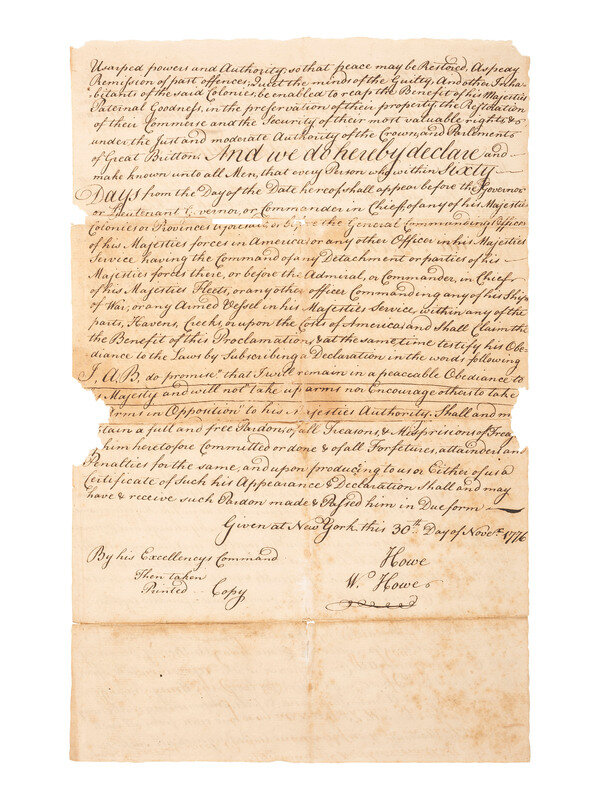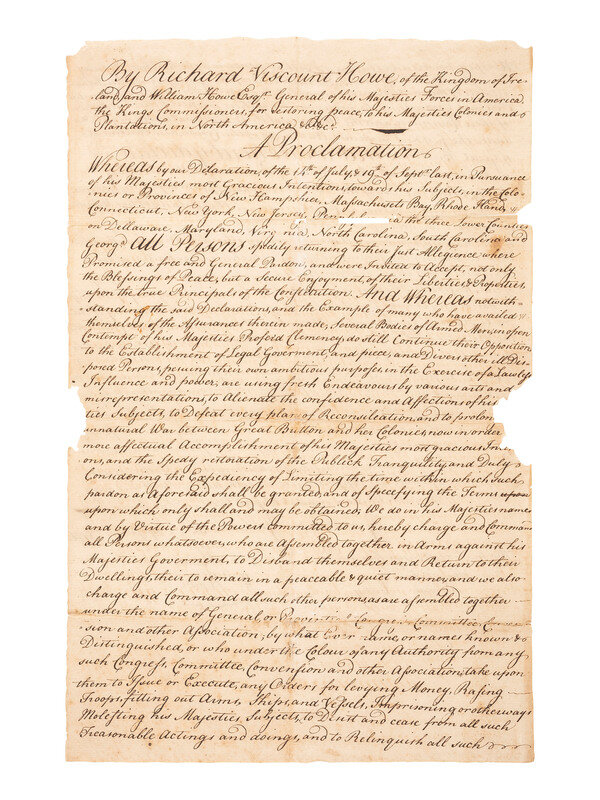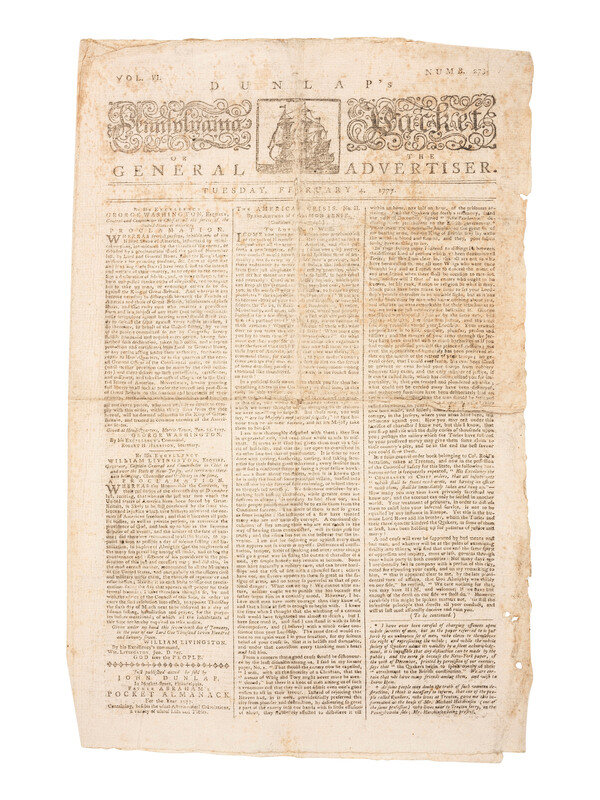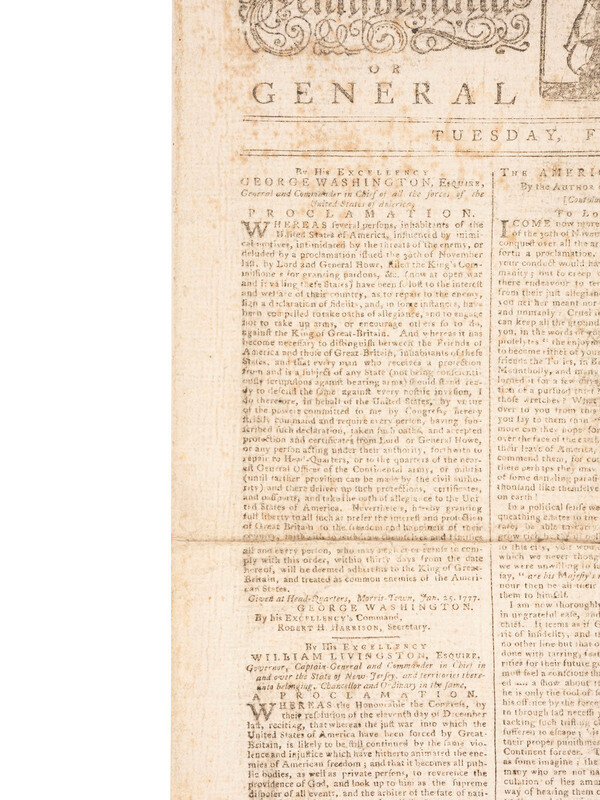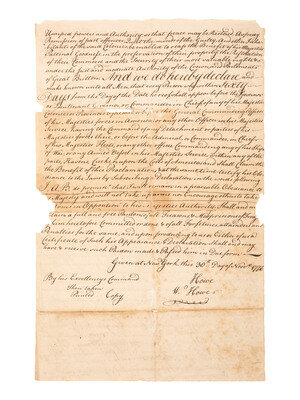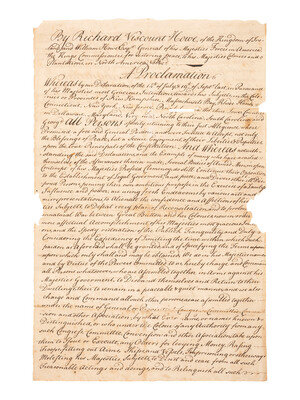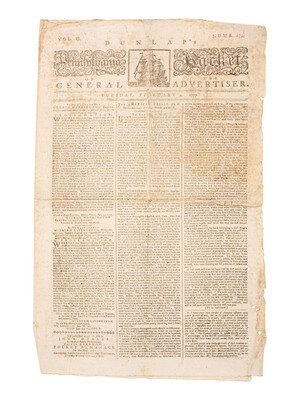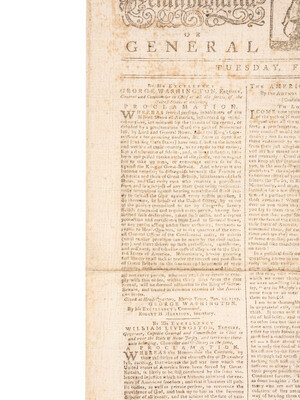Condition Report
Contact Information
Auction Specialist
Lot 310
HOWE, Adm. Richard (1726-1799) -- HOWE, Gen. William (1729-1814). "A Proclamation" from Lord Howe offering clemency for the declaration of a loyalty oath. 30 Nov. 1776. [With:] Washington's printed response to the British proclamation. 4 Feb. 1777.
Sale 2057 - American Historical Ephemera and Photography
Oct 25, 2024
10:00AM ET
Live / Cincinnati
Own a similar item?
Estimate
$5,000 -
7,000
Lot Description
HOWE, Adm. Richard (1726-1799) -- HOWE, Gen. William (1729-1814). "A Proclamation" from Lord Howe offering clemency for the declaration of a loyalty oath. 30 Nov. 1776. [With:] Washington's printed response to the British proclamation. 4 Feb. 1777.
"A Proclamation." 2pp, approx. 8 1 /4 x 13 in. New York, 30 November 1776. "By Richard Viscount Howe, of the Kingdom of Ireland, and William Howe, Esq. General of His Majesties Forces in America, the Kings Commissioners for restoring peace, to His Majesties Colonies and Plantations in North America." Secretarially signed on page 2 "Howe" and "W. Howe" alongside added notation "By his Excellencys Command / Then taken / Printed -- Copy."
Provenance: Livesey family of Maryland and Pennsylvania.
A SCARCE CONTEMPORARY MANUSCRIPT COPY OF ADMIRAL HOWE'S NOVEMBER 1776 PROCLAMATION OFFERING PARDONS TO COLONISTS WILLING TO SWEAR A LOYALTY OATH.
The Proclamation reads, in part: "Whereas by our Declaration of the 14th of July & 19th of Septr last, in Pursuance of his Majesties most Gracious Intentions towards his Subjects, in the Colonies or Provinces...All Persons spedily [sic] returning to their Just Allegiance where [sic] Promised a free and General Pardon, and were Invited to Accept, not only the Blessings of Peace, but a Secure Enjoyment of their Liberties & Properties upon the true Principles of the Constitution. And Whereas notwithstanding the said Declarations...Several Bodies of Armed Men, in open Contempt of his Majesties Profer'd Clemency do still continue their opposition to the Establishment of Legal Government...We do in his Majesties names and by Virtue of the Powers committed to us, hereby charge and Command all Persons whatsoever who are assembled together in Arms against his Majesties Government, to Disband themselves and Return to their Dwellings...and we also charge and Command all such persons as are assembled together under the name of General or Provincial Congress, Committee, Convention, and other Association...to Desist and cease from all such Treasonable actings , and to Relinquish all such Usurped powers and Authority so that peace may be restored....And we do hereby declare and make known to all Men, that every person who within Sixty Days...shall appear before the Governor, or Lieutenant Governor, or Commander in Chief of any of His Majesties Colonies or Provinces...and Shall Claim the Benefit of this Proclamation & at the same time testify his Obedience to the Laws by Subscribing a Declaration...[shall] obtain a full and free Pardon of all Treasons...."
[With:] WASHINGTON, George (1732-1799). "Proclamation" given as General and Commander-in-Chief of all the forces of the United States of America. Dunlap's Pennsylvania Packet, or General Advertiser. Vol.VI., No. 273. Tuesday, 4 February 1777.
4pp, approx. 10 1/2 x 16 1/2 in. An early newspaper appearance of General George Washington's response to Howe's Proclamation of 30 November 1776 concerning persons swearing British allegiance.
In response to Howe's "Proclamation," General Washington issued his own "Proclamation" "Given at Head-Quarters, Morris-Town," on 25 January 1777, requiring all who had repaired to the enemy under Howe's threats to immediately report to American forces and reaffirm their oath of allegiance to the United States. The text reads, in part: "Whereas several persons inhabitants of the United States of America, influenced by inimical motives, intimidated by the threats of the enemy, or deluded by a proclamation issued the 30th of November last, by Lord and General Howe,...have been so lost as to the interests and the welfare of their country as to repair to the enemy, sign a declaration of fidelity, and, in some instances, have been compelled to take oaths of allegiance, and to engage not to take up arms...And whereas it has become necessary to distinguish between the friends of America and those of Great Britain,...I do therefore, in behalf of the United States, by virtue of the powers committed to me by Congress, hereby strictly command and require every person, having subscribed such declaration, taken such oaths, and accepted protection and certificates from Lord or General Howe, or any person acting under their authority, forthwith to repair to Head-Quarters, or to the quarters of the nearest general officer of the Continental Army or Militia (until farther provision can be made by the civil authority) and there deliver up such protections, certificates, and passports, and take the oath of allegiance to the United States of America...and I do hereby declare that all and every person, who may neglect or refuse to comply with this order, within thirty days from the date hereof, will be deemed adherents to the King of Great-Britain, and treated as common enemies of the American States."
Lord Howe's "Proclamation" of 30 November 1776 was a substantive threat to General Washington and the Continental Army which was in need of a decisive victory after suffering a series of defeats in New York. Low morale, lack of supplies, untrained soldiers, expiring enlistments, and desertions also plagued Washington's forces at the time. Washington's daring 25 December 1776 attack on Hessian troops in Trenton, followed shortly thereafter by a win at the Battle of Princeton, provided a much-needed morale boost to the Continental Army. These victories likely also acted as a deterrent to any colonists considering accepting Howe's offer of a pardon, and heightened Washington's confidence in issuing his own "Proclamation" on 25 January 1777.
See also Lot 313. HOWE, General William (1729-1814). "Copy of General How's [sic] Proclamation of the 15 of March 1777" offering pardons to Continental Army soldiers who disarm and join the Loyalist cause. N.p., [1777].
